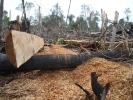 As Asia Pulp & Paper (APP) took the podium at the 12th Annual RISI pulp and paper conference to promote their corporate responsibility and paper products, leading Indonesian NGOs called on buyers and investors of APP to reject the company's misinformation and stop purchasing or financing the company until it met conditions articulated in an open letter calling for reforms in Indonesia's pulp and paper sector.
As Asia Pulp & Paper (APP) took the podium at the 12th Annual RISI pulp and paper conference to promote their corporate responsibility and paper products, leading Indonesian NGOs called on buyers and investors of APP to reject the company's misinformation and stop purchasing or financing the company until it met conditions articulated in an open letter calling for reforms in Indonesia's pulp and paper sector.
Long a controversial company, APP has recently stepped up its public relations efforts with a series of infomercials touting its environmental and social accomplishments and misleading certification claims. These moves may be an effort to pave the way for the company's anticipated issuing of bonds and a possible initial public offering (IPO) of its Chinese division, and comes at the same time as new investments in direct sales capacity in Europe and North American paper markets. In the early 2000's, APP defaulted on a debt of more than U.S. $13 billion and became ASia's biggest bankruptcy. In the aftermath of the bankruptcy, significant legal, social and environmental risks associated with the company's pulp production, natural forest clearance and pulpwood sourcing operations emerged.
Despite this, APP continues business as usual, having done little to mitigate the negative impacts of its pulp and paper operations. For example, APP continues to clear large areas of natural forest in Kerumutan's deep peat and Bukit Tigapuluh in Sumatra despite objections by local communities and NGOs. Destroying these peat forests is impoverishing indigenous communities that have customary ownership of these ecosystems and also causing millions of tons of greenhouse gas emissions as the forest is cleared and drained peat soils oxidize. Further forest loss in Bukit Tigapuluh threatens the survival of two indigenous tribes and Sumatran tigers, elephants and orangutans.
Italy is now the biggest European market for APP products. Customers and investors must be aware that being associated with APP poses major reputational risks" said Sergio Baffoni, of the Italian environmental organization Terra!
"We're trying to set the record straight for APP's customers and investors who may have been taken in by APP's misleading advertisements and glossy brochures," explains Teguh Surya Campaign Director of WALHI, the national environmental forum in Indonesia which has over 450 member NGOs. "APP and its affiliates continue to do more damage to Indonesia's forest dependent communities, wildlife and the world's climate that any other single corporate player", Teguh said.
Since it began operations in 1984, in Riau Province, Sumatra, APP has been linked to clearingan estimated 25 percent of the natural forest cover found at that time, much of it on carbon rich soils. This reckless deforestation has been driving endangered species like Sumatran tigers and elephants to local extinction - scientists estimate that as few as 400 Sumatran tigers are left in the wild. APP operations are also pushing local forest communities off their traditional lands and undermining local livelihoods, over the protests of these communities.
Eyes on the Fortest today published recent pictures of large amount of natural forest wood waiting to be unloaded at harbor of the APP's pulp mill in Riau and also pictures showing large area of good natural forest in Bukit Tigapuluh landscape being cleared in a concession of PT. Artelindo Wiratama, an APP associated company.
"Indonesian NGO's and the communities we work with have experienced the devastation caused by APP firsthand, so we can't be fooled by infomercials or environmental prizes - said Rivani Noor of the Indonesian national network, Community Alliance for Pulp and Paper Advocacy (CAPPA) - We urge APP to stop the destruction of natural forests and peatlands, respect community rights and tenure, resolve existing disputes and retract misleading statements about their low carbon footprint. This is how APP can go beyond business as usual and help fulfill Indonesia's greenhouse gas emission reduction targets and the transition to an equitable and low-carbon future for all Indonesians" he said.
Deforestation in Indonesia is a major contributor to climate change, as carbon stored in natural rainforests and peatlands is released after clearance and drainage. Roughly eighty percent of Indonesia's greenhouse gas emissions are due to deforestation and degradation, which has pushed Indonesia into third place (behind the China and the U.S.) on the list of the world's largest greenhouse gas emitters. APP/SMG and their affiliates are considered to be one of the largest contributors to these emissions.


